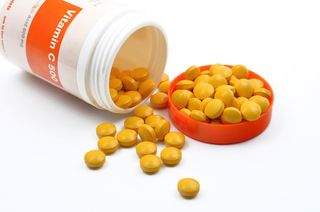Supplements May Have Negative Impact on Endurance Training

Certain vitamin supplements may blunt the muscle's natural response to endurance training, a new study from Norway suggests.
In the study, 54 healthy participants were randomly assigned to take vitamin C and E supplements, or a placebo, during an endurance training program that consisted of running three to four times a week. Participants completed fitness tests and underwent a muscle biopsy at the beginning and end of the study to see how their bodies adapted to the training.
After 11 weeks, the muscles of the people in the placebo group had produced more mitochondria — "powerhouses" of the cells — a natural response to training. However, those in the supplement group did not see an increase. [7 Common Exercise Errors And How to Fix Them]
The findings suggest "vitamin C and E supplements blunted the endurance training-induced increase of mitochondrial proteins, which are needed to improve muscular endurance," study researcher Dr. Gøran Paulsen, of the Norwegian School of Sport Sciences, said in a statement.
Despite these cellular effects, the supplements did not appear to hurt participants' overall performance — both groups had similar improvements in their maximal uptake of oxygen, an indicator of endurance.
Still, Paulsen said, "our results indicate that high dosages of vitamin C and E — as commonly found in supplements — should be used with caution, especially if you are undertaking endurance training."
Many people take vitamin supplements, even though there's little evidence that supplements benefit health or athletic performance. In fact, several recent studies have suggested that high doses of vitamins may be harmful.
Sign up for the Live Science daily newsletter now
Get the world’s most fascinating discoveries delivered straight to your inbox.
Study participants in the supplement group took 1,000 milligrams of vitamin C and 235 mg of vitamin E per day. According to the National Institute of Health, adults should not take more than 2,000 mg of vitamin C and 1000 mg of vitamin E per day.
Although vitamin supplements did not seem to affect participants' overall performance, it could be that some people are more affected by supplements than others, the researchers said. They said that the four participants with the biggest improvements in running performance seen in the study were all in the placebo group.
The researchers noted that the study looked at a marker for mitochondrial production, and although increases in this marker are strongly linked with increases in mitochondria production, it is not a direct measure of mitochondria production.
Figuring out exactly how vitamin supplements may interfere with improvements in muscle endurance requires further research, the researchers said. The study is published today (Feb. 3) in the Journal of Physiology.
Follow Rachael Rettner @RachaelRettner. Follow Live Science @livescience, Facebook & Google+. Original article on Live Science.

Rachael is a Live Science contributor, and was a former channel editor and senior writer for Live Science between 2010 and 2022. She has a master's degree in journalism from New York University's Science, Health and Environmental Reporting Program. She also holds a B.S. in molecular biology and an M.S. in biology from the University of California, San Diego. Her work has appeared in Scienceline, The Washington Post and Scientific American.